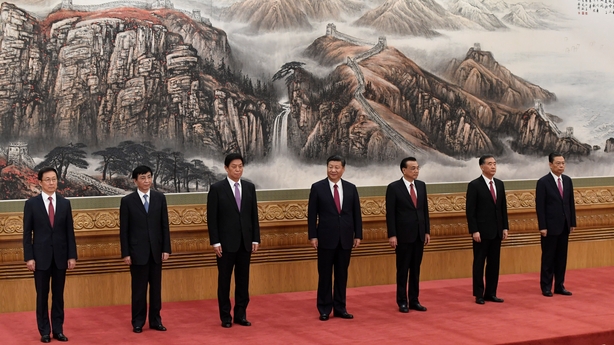Xi Jinping has secured a second five-year term as the head of China's Communist Party, confirming his rise as the country's most powerful leader in decades.
His reappointment capped a twice-a-decade congress of the Communist Party that gave him a freer hand to accomplish his ambition of turning China into a global superpower with a world-class military by mid-century.
The Chinese leader was elected to head the Politburo Standing Committee, with Premier Li Keqiang retaining his seat on the ruling council alongside five new members.
Li Zhanshu, Zhao Leji, Han Zheng, Wang Huning and Wang Yang were promoted, replacing five retiring members, including anti-corruption chief Wang Qishan, a key Xi ally.
The vote was held behind closed doors with many major Western news organisations excluded from the ceremony.

However, the event broke with recent precedent by failing to include a clear successor to the president among the seven-man line-up.
All seven are in their 60s, and for the first time no Standing Committee member will have been born before the 1949 Communist revolution.
Guangdong party secretary Hu Chunhua and Chongqing party boss Chen Min'er had previously been seen as prominent contenders to succeed Mr Xi among the party's so-called sixth generation of leaders.
However, they were not included in the Standing Committee. Instead, both were named to the wider 25-member Politburo, a rung below the Standing Committee.
Mr Xi himself was elevated to the committee in 2007, when he was 54, and succeeded Hu Jintao as general secretary and president five years later.
Despite their promotion to the nation's highest leadership circle, the new committee members are likely to have much less influence than their predecessors under a newly empowered Mr Xi.
The constitutional amendment, which the congress passed yesterday, has put Mr Xi in the rarefied company of the nation's founder Mao Zedong, and Deng Xiaoping, the architect of its economic reforms.
In the past two administrations, decisions were the result of horse-trading and consultation among members of the standing committee, the council of party elders that has led China since Mr Deng's death in 1997.
But with his name in the constitution, Mr Xi has become the nation's ultimate authority, likely giving him the last word on all major decisions.
US President Donald Trump has said he spoke to Xi Jinping and congratulated him on his return to power.
The two leaders also discussed North Korea and trade.

